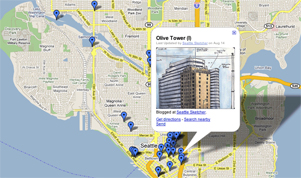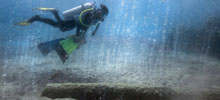Seattle Sketcher
An illustrated journal of life in the Puget Sound region by Times artist Gabriel Campanario.
Blog Home |
E-mail Gabriel |
![]() Subscribe | Seattle Sketcher on Facebook | Twitter feed
Subscribe | Seattle Sketcher on Facebook | Twitter feed
Invisible injuries grip young veterans

These young war veterans didn't lose any limbs in combat. They returned home from Iraq and Afghanistan a few years ago all in one piece, but soon began to feel the pain of invisible injuries they didn't even realize they had.
We hear the names of these injuries more and more these days: PTSD for post-traumatic stress disorder and TBI for traumatic brain injury. Yet it is hard to fully understand the struggles these veterans go through to keep themselves together.
As Veterans Day rolls around Sunday, I will be thinking of these soldiers and the thousands more among us whose wounds cannot be seen but are very real.

TIMM LOVITT
After two war tours, Timm Lovitt came back home to Lynnwood in 2005 with one goal in mind: to get his college degree. But the former U.S. Army sergeant quickly found himself at a disadvantage. He couldn't retain anything he studied would study. "I would read a page and immediately forget what I had just read," Lovitt, 30, told me over coffee at Edmonds Community College Student Union Hall.
Doctors told him that he had lost his visual retention due to a traumatic brain injury. Lovitt guesses it may have been caused by the shock of a suicide car bomb explosion in Baghdad. He survived the attacked and was back on patrol the next day.
The TBI diagnosis allowed Lovitt to benefit from school exceptions for people with disabilities, like extended time for exams, and access to audiobooks -- and found that his memory responded to sound better than images. In 2010, Lovitt graduated with honors from Seattle University.

NIKKI DAVIS
In Iraq, Air Force Security Forces sergeant Nikki Davis and her eight-person squad provided ground security to Air Force installations. Asked about her worst experience, the self-described tough girl from Tacoma only wants to say this: "We were always fired up and ready to go."
After her deployment, Davis, 34, quit her eight-year military career and started a new life. She juggled college classes and a job as a Pierce County bus driver.
Eventually, the stress of combat caught up with her. She couldn't control her anger and felt no empathy for people. "Anything would get me from 2 to 60 in a hearbeat," said Davis, who still worries someone may sneak up behind her if she has her back to the door.
Davis only started treatment for her PTSD four months ago, but she's happy she finally sought help. "I need help. It takes a while for a veteran to say those words."

JEREMY GRISHAM
Jeremy Grisham, a Vashon Island native who is now 37, grew angry and depressed after returning from Iraq in 2003. The Navy medic felt he could have done more to save Iraqi civilians left dead and injured on the roadside during the speedy march to liberate Baghdad.
When he returned to San Diego, where he was stationed with the Marines at Camp Pendleton, Grisham struggled at work. Even the most simple medical procedures became hard to deal with; everything felt like a life-or-death situation. He started cutting himself and had thoughts of suicide.
In 2005 he was diagnosed with PTSD and left the Navy, beginning a slow path to recovery and eventually returning to the Puget Sound area. Grisham has found ways to cope by working on habitat-restoration projects with other veterans and rollerskating with friends. "It's important not to let the injuries define us."

BERNARD BAKER
A group of Vietnam vets recently helped Bernard Baker move into his new house in the Tacoma area. Baker, a 6-foot-1 guy with the build of a basketball player, was so embarrased to get the help from older guys that he got dizzy and vomited.
Severe vertigo and migraines are just some of the symptoms of his TBI. Too much light can also make him faint and he often wears sunglasses inside the house.
Of his tour of duty in Iraq in 2004 and 2005, the Brooklyn native remembers the adrenaline rush of combat, bullets whizzing by, and an IED hidden in a garbage can that exploded within feet of his Stryker vehicle, knocking him off his seat.
Baker, 36, spends much of his time at doctor appointments now. Life feels like a roller-coaster ride, he said. "If you don't seek help, your problem gets worse ... I just don't want to be left behind. Don't forget me."
What has drawn your attention around Seattle lately? Send me your suggestions of interesting places and people to sketch via e-mail, Facebook or Twitter. Have a great weekend
Nov 20 - 5:15 PM 'Elles' take over at the Seattle Art Museum
Nov 20 - 4:40 PM Blog upgrade
Nov 14 - 3:23 PM Waiting, waiting, waiting
Nov 14 - 1:39 PM Waiting, waiting, waiting
Nov 12 - 3:52 PM Sketching field notes: Drawing and listening



You can browse a gallery of sketches and purchase prints.











